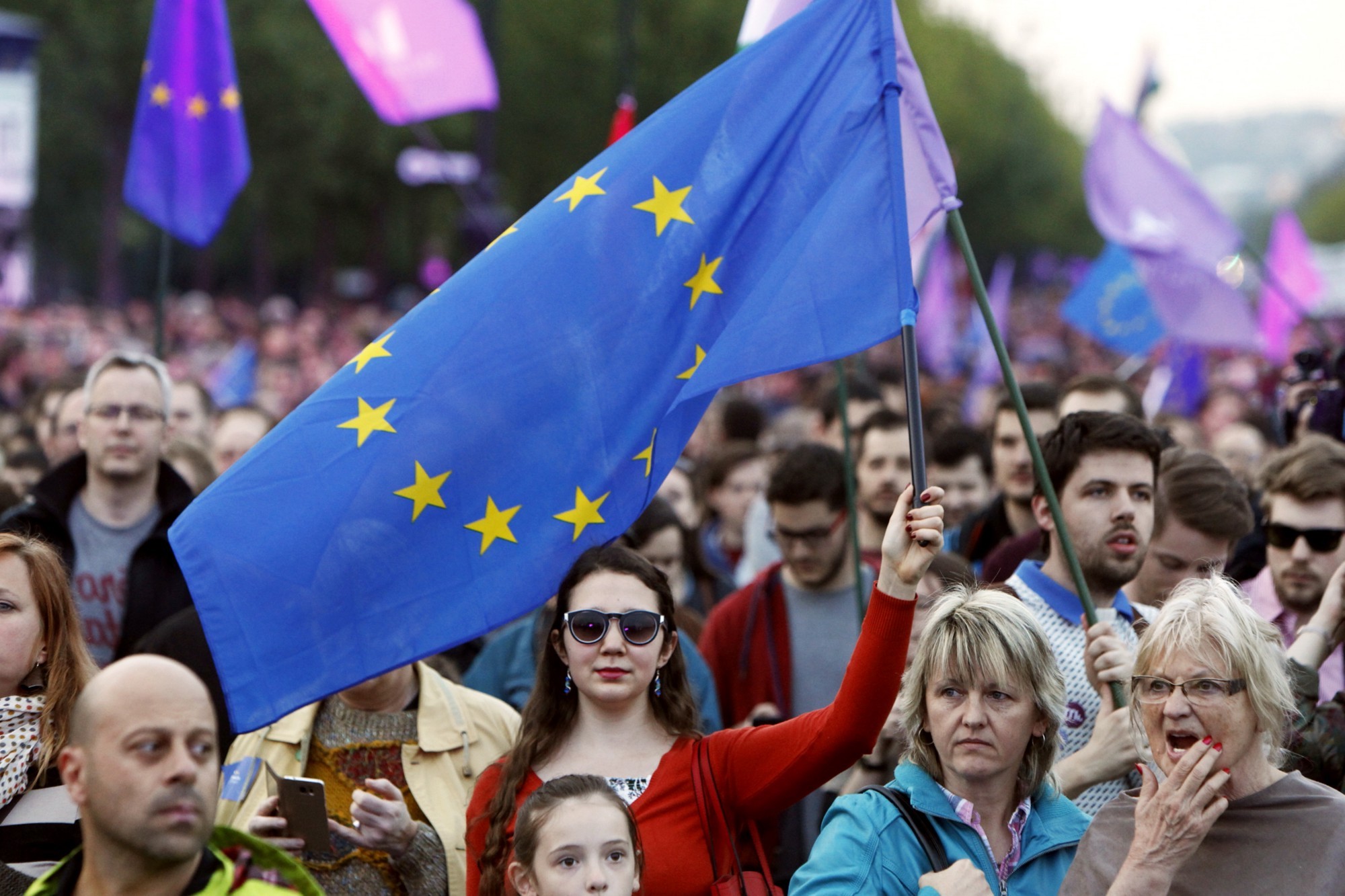
There is not only a clash among civilisations. There is a clash within the West: between the elites and the people, between globalists and the nationalists, between universalists and localists.
It has its roots in two different kinds of enlightenments – the Continental and the British. The center-right should embrace the British enlightenment and put trust in the reason of the people not in the reason of one man. Building the future institutions of Europe should be based on people’s sense of European identity which needs to be developed in advance of any major changes to European political structures.
Two competing narratives have been framing the debate after the end of the Cold War and the fall of communism. The first was “the end of history” as argued by Francis Fukuyama. The second was that of “the clash of civilisations” by Samuel P. Huntington.
The end of history has been proven wrong in the international context. The clashes, particularly between the Eastern Orthodox and Western Civilization returned in Yugoslavia, Ukraine and Georgia.
[alert type=blue ]Author: Žiga Turk is a Professor at the University of Ljubljana, Slovenia. He holds degrees in engineering and computer science. As academic he studies design communication, internet science and scenarios of future global developments, particularly the role of technology and innovation. [/alert]
The clash between Islam and all other civilisations is leaving bloodstains not only at the external borders of the Islamic civilization but also within countries where Islam is a minority: in the US, Spain, UK, Belgium, France, Germany we are witnessing a series of terrorist attacks.
Until recently, however, it would seem that the history ended at least within the Western Civilisation. That the societal model framed by human rights, rule of law and liberal democracy won and that it is only a matter of time, will and (sometimes military intervention) that it would spread to the rest of the world. Well, with the surge of the so-called populism, it appears that the history did not even end within the West.
The clash within
There is a clash within the Western civilisation between the elites and the people, between the globalists and the nationalists, between multiculturalists and monoculturalists. More elaborated framings of the clash include anywheres vs. somewheres[1], false individualism vs. true individualism[2], French vs. British enlightenment[3] and left vs. right moral foundations[4].
Actually, the clash is between the Western Civilisation and an emerging universal, global civilization that is uncomfortable with the very notion of the existence of the West and the Western Civilisation, its philosophical and religious roots.
A new civilisation is emerging within the West that is breaking from Western tradition and its transcendent base. It is aspiring to be global, present on the whole Gaia, not limited by geography, race or the traditions of its source civilisation.
It is based on universalism, multiculturalism, environmentalism and borrows shallow philosophical and religious snapshots from all around the world.
Haidt[5] would have claimed it is attractive to people with weak “group cohesion” moral foundations of authority, loyalty and sanctity. It considers itself cosmopolitan, modern, progressive and enlightened while its opponents are portrayed as rural, backward and conservative.
What side for the conservative-liberal?
What should be the position of a conservative-liberal in this clash? Particularly the work of Hayek and Himmelfarb offers a solid foundation – Hayek for those leaning towards a classical liberal side and Himmelfarb for the conservatives. The left will instead read Descartes, Rousseau, Marx and Marcuse.
In his essay on individualism, Hayek writes about two kinds of individualism, the false and the true one. The false individualism – one could also call it a vulgar individualism – puts trust in an individual human mind, in individual reason that is powerful enough to come up with superior ideas on how society should be organised than the average plebeians can.
True individualism, on the other hand, argues that the sum of the reason of all people is larger than that of any individual or group. That the results achieved by a society of free reasonable individuals can produce results that are beyond the understanding of any single individual. Much like the invisible hand of the market is more efficient in allocating resources, the “invisible hand of morality” is more efficient in organizing the society than the “engineers of society”.
Which some politicians and some dictators would like to be. Hayek advises that the formal rules that explicitly define the functioning of a society should not do much more but to encode the principles that have established themselves through the spontaneous collaborative processes.
This approach goes against the championing of human reason that is supposed to be the main result of the enlightenment. Himmelfarb takes Hayek’s point to its historical root.
The vulgar individualism has its roots in the French enlightenment that indeed praised human reason and rejected faith, superstition and customs as an argument in societal problem solving. In the French enlightenment, pure reason was put in conflict against the church and faith.
It has this idea that human reason can engineer society, redefine relations in the society, even replace a seven-day week with ten-day week, because it is easier to scientifically compute time that way. The idea that brilliant reason that create better societies has provided the philosophical basis for the French revolution and all totalitarian regimes of the 20th century.
Interestingly, no such regimes ever appeared in societies that were shaped not by the French but by the British enlightenment. Which, by the way, did not position reason against faith.
On the contrary, it complemented reason with social virtues, or in the words of Adam Smith, moral sentiments, that bind people together. Virtue in dealing with other people and humility about the power of individual reason to plan or engineer society lead to respect of tradition and feelings.
Unfortunately, with a bit more self-interested US and Britain in exit, the EU is losing advocacy of that kind of enlightenment. Europe is left with the French trust in human reason and the German efficiency to implement the brilliant ideas it will come up with.
Conclusion
Hayek and Himmelfarb tell essentially the same story: that the vanity of human reason is dangerous when an individual or an elite wants to redesign or reshape institutions that have been evolving for centuries as a result of spontaneous collaboration among people. People did use their reason but also their morals to create and give meaning to institutions such as private property, work, marriage, and nation state.
Changing, dismantling or replacing them too quickly – perhaps based on a thin albeit democratic majority instead of broad acceptance – had tragic consequences in the past. It is the role of the conservatives to prevent that.
Less tragic but nevertheless negative was also sticking to ways that times have surpassed. The most important words in the recent Merkel speeches are “we Europeans”.
These two words need to be repeated and repeated for decades. When they sink in, when European identity is established and present in the Europeans, the European Union will be able to get elements of a nation state that go beyond the common market and common border protection.
European conservatives should be pushing in that direction – not by pushing the institutional innovation but instead the European identity. In this way and ever closer union will be a result of spontaneous collaboration among Europeans and not a project of a political elite.
Conservatives cannot be louder than the “progressives” asking for more Europe. But we can be more reasonable and more realistic.
[toggler title=”SOURCE” ]This article was originally published by Martenscentre.[/toggler]
[1] Goodhart D. (2017). The Road to Somewhere: The Road to Somewhere: The Populist Revolt and the Future of Politics, C Hurst & Co.
[2] Hayek F.A. (1948) Individualism and Economic Order, University of Chicago Press.
[3] Himmelfarb G. (2017) The road to modernity, Vintage Books.
[4] Haidt, J. (2012). The righteous mind: Why good people are divided by politics and religion. Vintage.
[5] Ibid.



